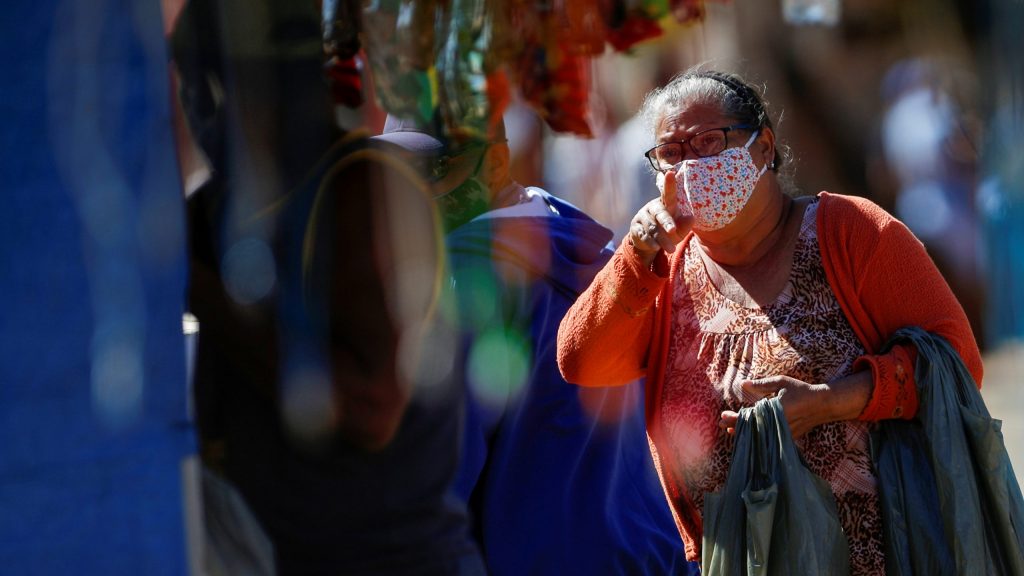With COVID-19 contagions climbing in several countries around the world, an Italian NGO with ties to the Catholic Church has implemented projects for the mass production of masks to help the most vulnerable populations.
In Brazil, where on July 13 the number of confirmed cases totaled more than 1.8 million with over 72,000 deaths, 400 inmates from 23 alternative prisons, Minas Gerais and Maranhao states are producing 350,000 masks to reduce the spread of the new coronavirus.
The innovative APAC prison system, which has no guards and no weapons to keep inmates incarcerated, has been supported by the Association of Volunteers International Service, or AVSI, as a humane alternative to successfully rehabilitate individuals back into society.
"I put myself in the shoes of the other who have no way of acquiring a mask to protect themselves. At this moment of serving a sentence, deprived of liberty and in social isolation, we are redeeming our sentence with a heart turned to all people who cry out for life, and in this small gesture we are part of humanity that is in solidarity with the population, in particular, the neediest," inmate Edemir Cardoso da Silva Junior told Catholic News Service.
Silva Junior is in his eighth year of a 45-year sentence at the Januaria APAC in Minas Gerais.
Jacopo Sabatiello, vice president of AVSI Brasil, said the organization obtained $47,000 from the Italian bishops' conference and $454,000 from the European Union for the purchase of sewing machines and materials for mask production as well as products for the inmates, such as gloves and other necessities.
AVSI is working with the Brazilian Fraternity of Assistance to Convicts on the program.
"In addition to learning new skills they can use after this pandemic is over, the project contributes to reduce the idleness these men and women have been facing during this period. Family visits, as well as classes and volunteer visits, have been prohibited, and that shakes up morale," Sabatiello said.
The founder of the Association of Comboni Lay Missionaries in Brazil, Valdeci Antonio Ferreira, has been working with APAC inmates for 36 years.
"Through this project, the prisoners have the opportunity to show solidarity and stay close to civil society during the crisis. This pandemic has hit them very hard, and with no visits, they (inmates) feel abandoned," said Ferreira, who is FBAC director. He said many of the masks made in the Pouso Alegre APAC are being directed toward the town's cancer hospital.
"I feel good to know that, even though I'm serving a sentence, I can help to keep COVID-19 from spreading. (The program) gave me the opportunity, not only to serve my sentence in a dignified way, but also to put my professional skills into practice and to use those skills to collaborate for the protection of the entire society," said Philipe Augusto Ferreira Leal, 30, who is serving a 14-year, 10-month sentence at APAC of Arcos in Minas Gerais.
"This project not only made me grow, but also made me reflect on the importance of caring for others," he added.
Across the Atlantic Ocean in Kenya, AVSI also is helping make masks to fight the virus.
In Dadaab, a refugee camp in northeastern Kenya, the NGO is supporting the mass production of face masks to help the refugees protect themselves against COVID-19. The three camps of the settlement have remained closed since March when the Kenyan officials reported the country's first cases.
"The need was there since there was no other intervention on masks provision prior to ours," Henry Waitindi, AVSI's Dadaab program manager, told CNS.
Using local tailors and locally sourced material, AVSI is producing and distributing 8,600 masks in the camp. With more funding, it hopes to scale-up the number to 300,000. Many Muslim women in the camp are finding the AVSI masks friendlier because the elongated straps allow for use without removing their veil.
Refugees in Dadaab are mainly Somali Muslim who have fled al-Shabaab extremist violence and famine. AVSI started working in the camp in 2009 following an invitation by U.N. High Commissioner for Refugees to help with teacher education and infrastructure development.
Waitindi said the Catholic NGO's effort has been successful because it "evangelizes silently" through humanitarian work.
Contributing to this story was Fredrick Nzwili from Nairobi, Kenya.

